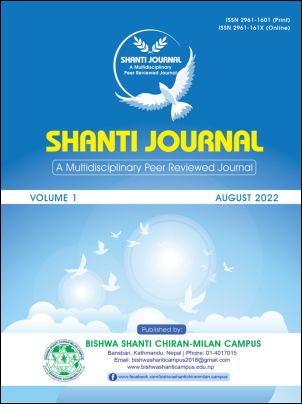Economic Welfare and the COVID-19 Pandemic in Nigeria: An Overview of the First Half of 2020
DOI:
https://doi.org/10.3126/shantij.v1i1.47907Keywords:
Economic Welfare, COVID-19, Robust RegressionAbstract
Corona virus pandemic is a current misery not only to health status but also to economic wellbeing and to the world at large. This study examines the relationship between the pandemic outbreak and economic welfare using daily data on proximate economic welfare measures-real GDP and changes in consumer price index-and the disease indicator variables-discharge rate, fatality rate, spread rate and number of tested cases. The Prosperity theory is adopted and the estimation issue is rooted from the robust least squares technique due to the failed normality assumption of the conventional least squares. Results indicate that corona virus due to its spread lowers labour supply and causes production shortages and subsequently results in hike in price and loss of real income value. High discharge rate can increase real income value and hence economic welfare. Immediate Financing, regulatory, equity and diversification strategies are needed to revive the Nigerian economy.
Downloads
Downloads
Published
How to Cite
Issue
Section
License
Copyright (c) 2022 J.O. Saka

This work is licensed under a Creative Commons Attribution-NonCommercial 4.0 International License.
This license enables reusers to distribute, remix, adapt, and build upon the material in any medium or format for noncommercial purposes only, and only so long as attribution is given to the creator.




